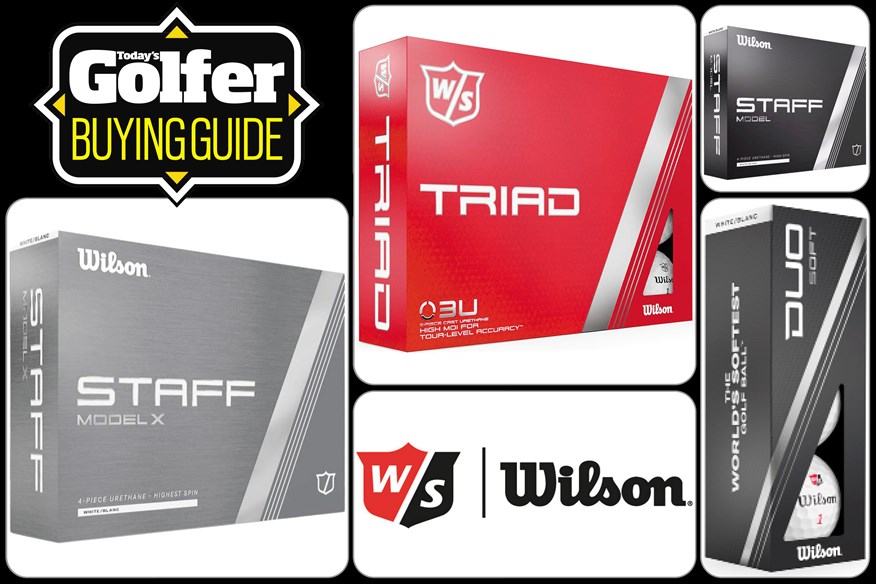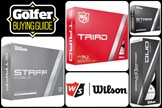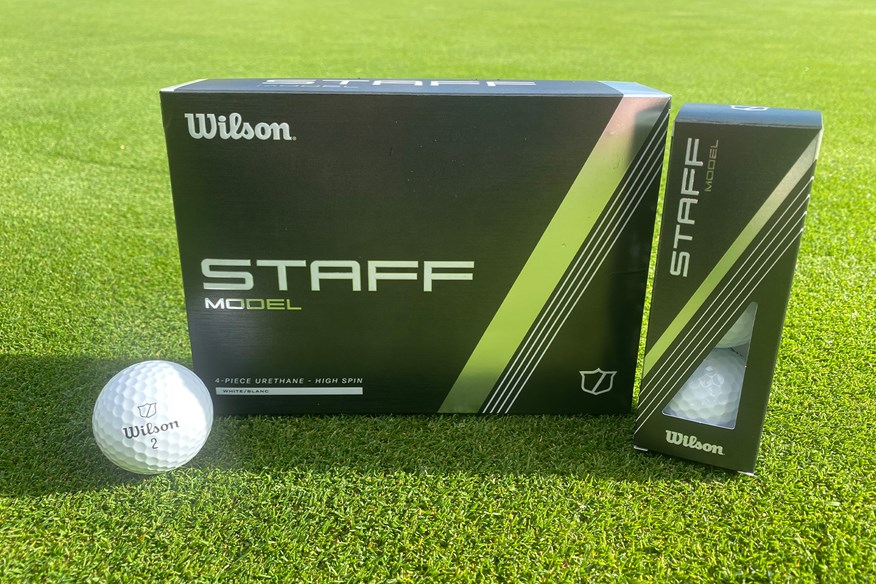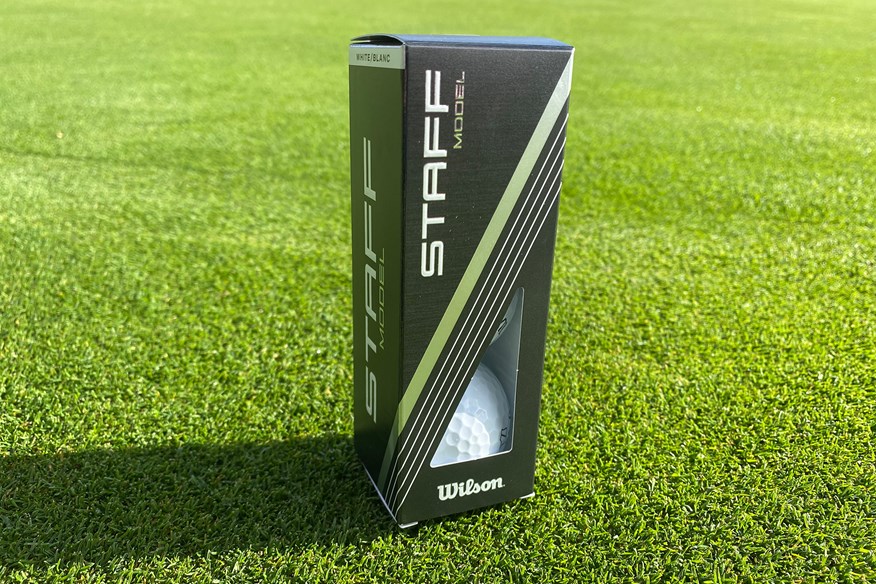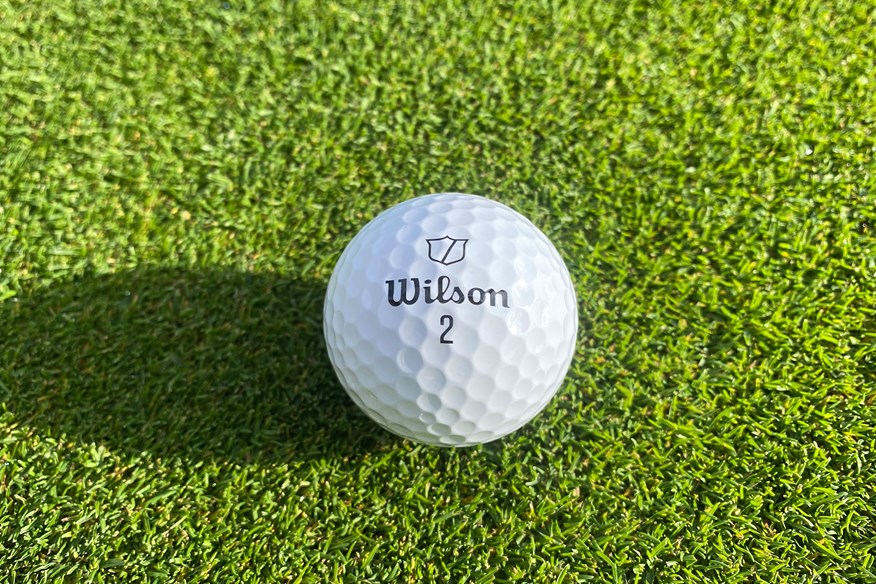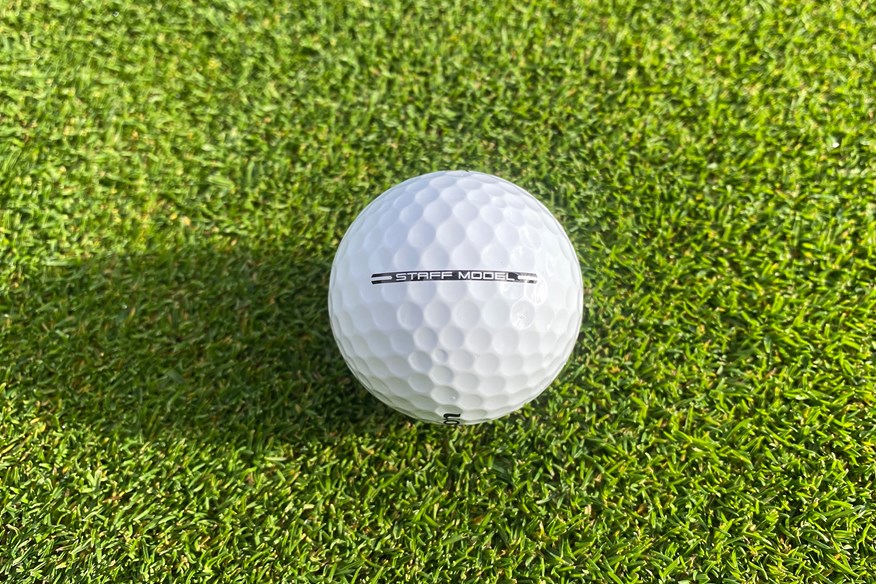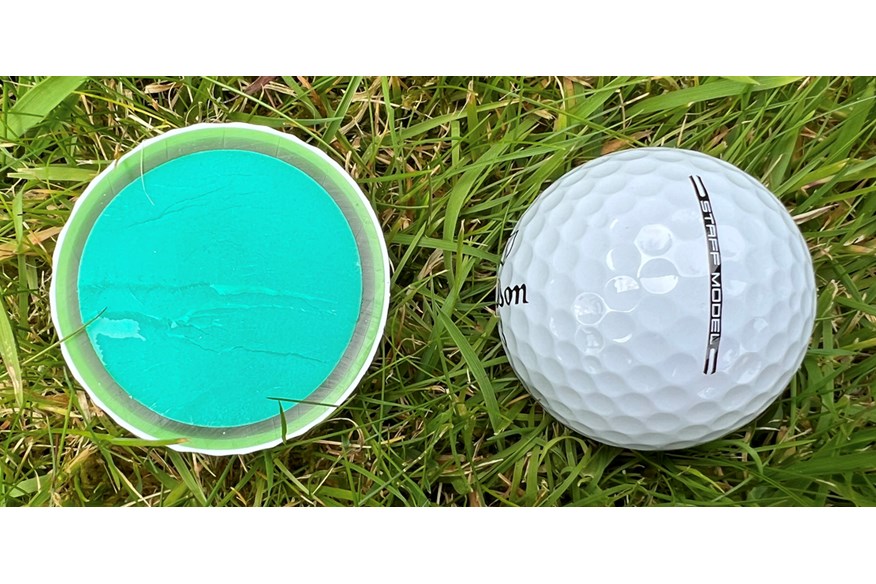Best Wilson Golf Balls 2025: Consistent and high-performing
Last updated:
Click below to find out more about Today's Golfer's golf ball testing process.
Wilson are renowned for producing quality balls in a number of sports, so why not give their golf balls a go?
Jump to:
Wilson might not manufacture as many golf balls as other companies, but the best Wilson golf balls are excellent (often cheaper) alternatives to the better-known brand’s models. Wilson are one of sports top dogs and that reputation is only strengthened by their influence in golf.
With a limited number of golf balls on the global market, Wilson are able to nail their range of performance golf balls, something that should put them in good stead for navigating the guidelines of the golf ball rollback. There is a golf ball for every budget and they offer incredible value compared to golf balls of a similar standard.
The best Wilson golf balls at a glance:
Best premium: Wilson Staff Model X | View Offer
Best for mid-handicappers: Wilson Triad | View Offer
Best for beginners and high handicappers: Wilson Duo Soft | View Offer
Best feeling: Wilson Staff Model | View Offer
One thing you can guarantee from Wilson’s golf balls is that they are expertly designed and manufactured to the highest standard. Whether it’s their golf balls intended for beginners and high-handicappers, or those for Tour players to use. Their limited selection are incredible alternatives for all golfers and while they don’t have a specific ladies’ golf ball they are played with and loved by countless female golfers.
Despite being one the most well-known brands in golf, Wilson are often overlooked and their products are sometimes not as well received as they should be. Not every golfer will be running to the store for Wilson’s premium golf balls over Titleist’s or Callaway’s – but they should be considered.
Best Wilson Golf Balls 2025
Wilson's Tour standard golf ball
Best premium Wilson golf balls
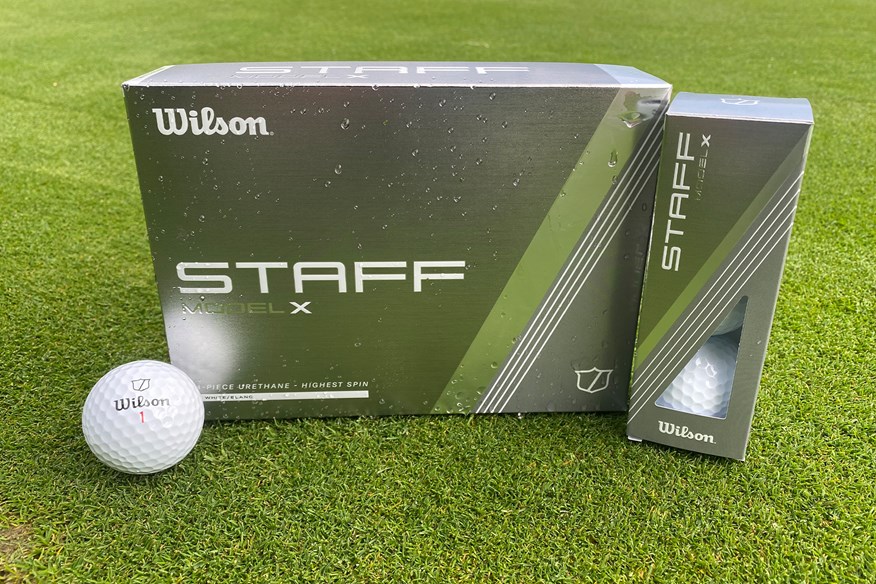

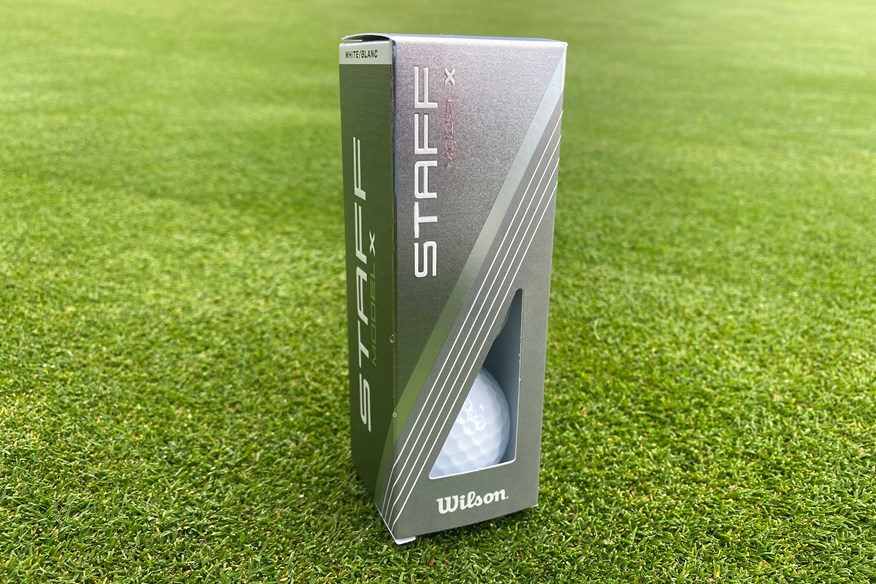
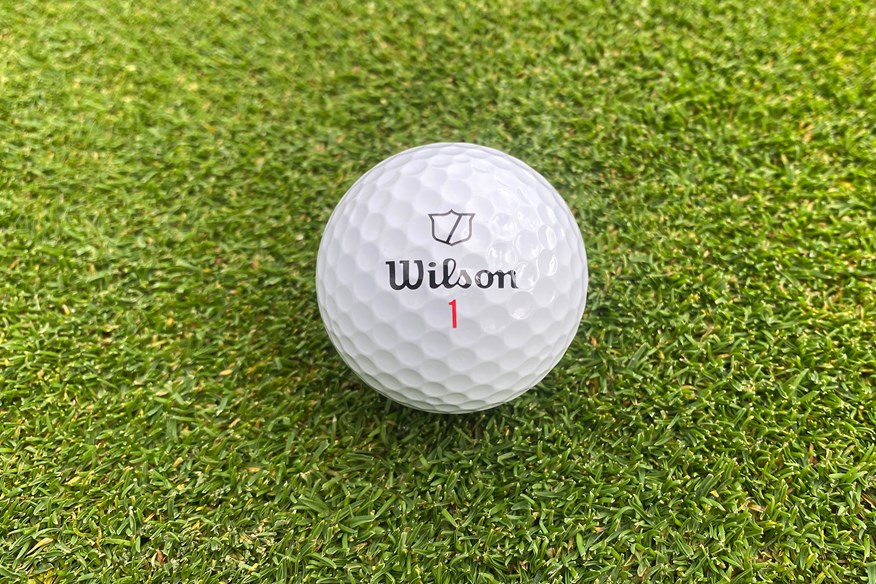
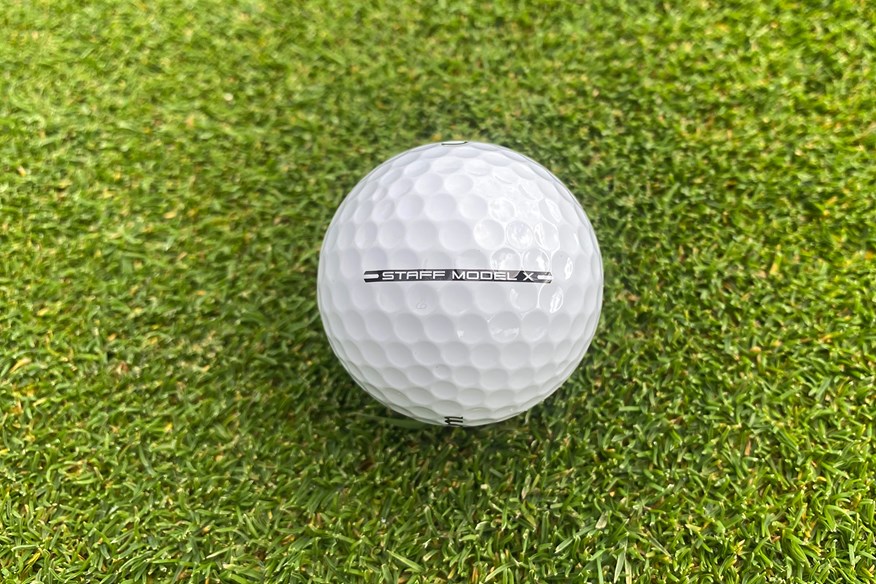
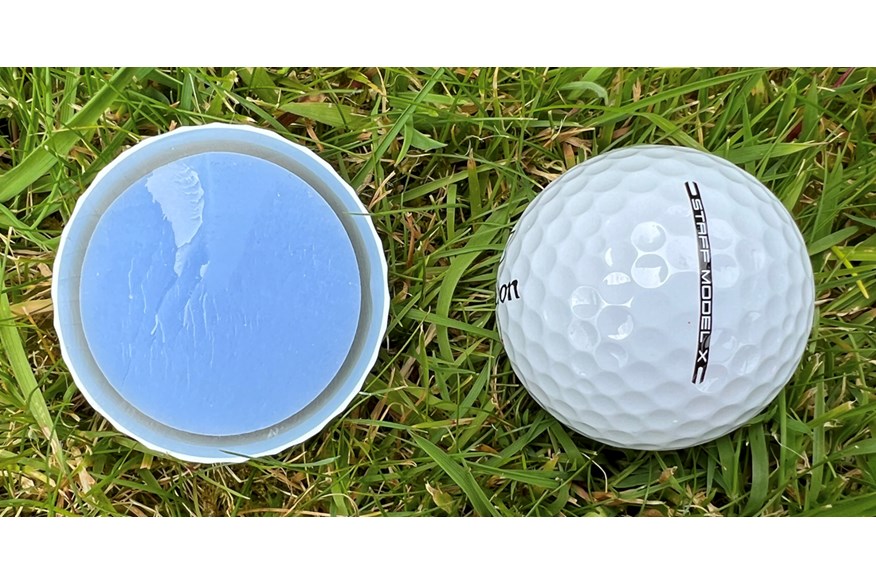
As a challenger to some of the biggest golf ball manufacturers, Wilson can often get overlooked and disregarded in the conversation and thought process when choosing golf balls - especially premium golf balls. But it shouldn't be the case. If you'd normally play with anything from a Titleist Pro V1 X to a Bridgestone Tour B X, you should definitely consider swapping them out for the Wilson Staff Model X.
Read our full Wilson Staff Model X golf balls review
Pros
- Excellent distance off the tee
- Really impressive short game spin and control
- Amazing responsive feel
- Could be played by a top-30 Tour pro (keep your eyes peeled)
Cons
- Firm feeling might not please everyone
| Construction | 4-piece |
| Cover | Urethane |
| Dimples | 362 |
| Feel | Firm |
| Flight | High |
| Long game spin | Low |
| Short game spin | High |
| Colour options | White; Yellow |
- V-Cor advanced performance
- Firm compression core with velocity-boosting additive
- 3SIX2 seamless urethane cover
One of the best balls to help golfers break the illustrious 80 barrier
Best Wilson golf balls for mid-handicappers
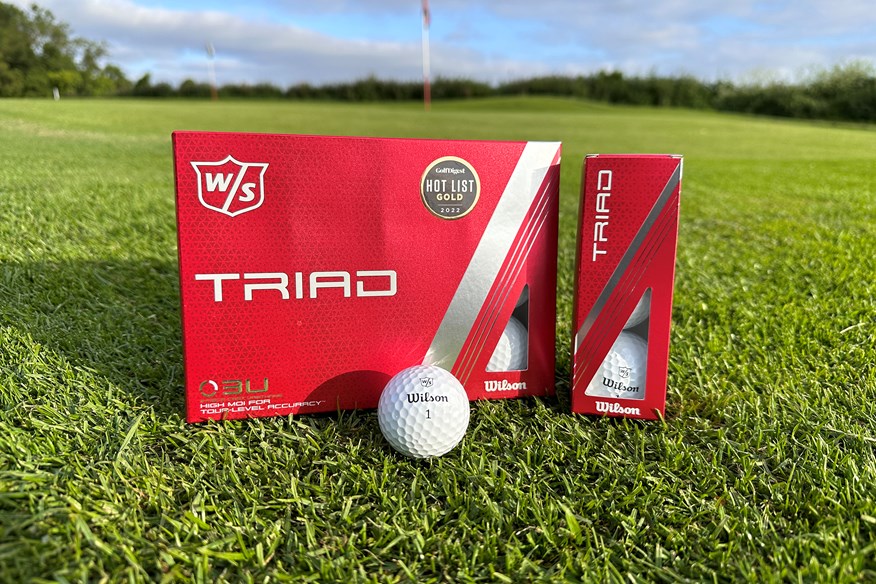

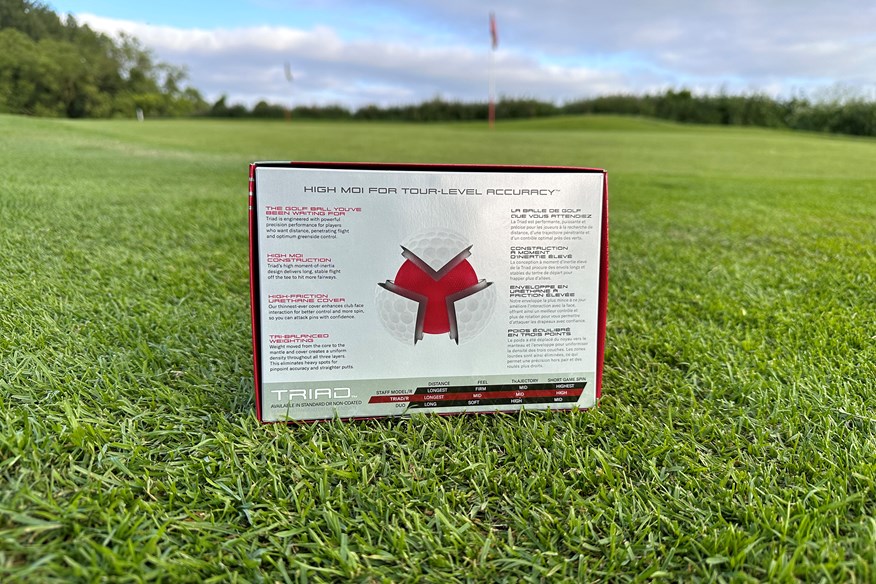
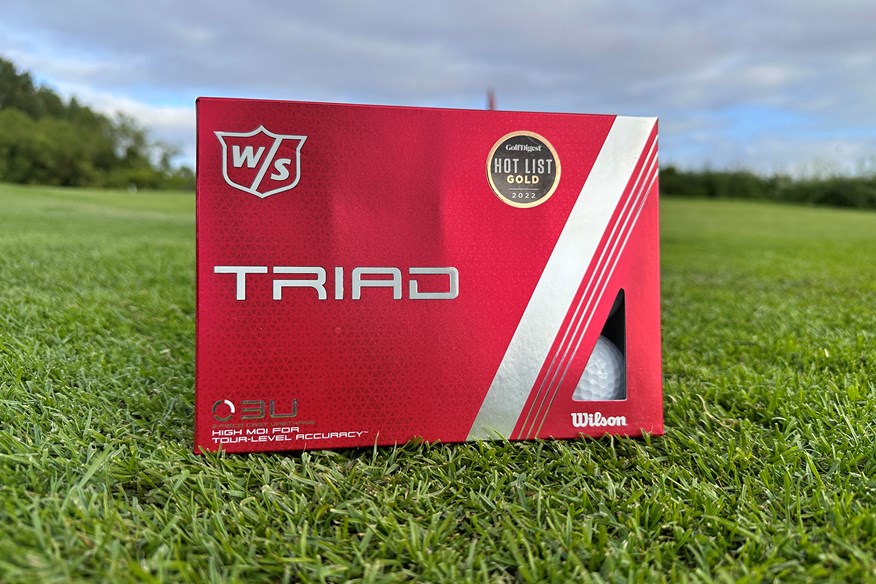
I bet you're waiting for the negatives now, but there aren't any! This ball is firmer than other golf balls of a similar ilk which might put some people off, but it's definitely not a reason to avoid the Triads. Wilson offers these balls in a painted and unpainted (raw) finish. The raw finish, they claim, enables the ball to perform better aerodynamically - it's hard to see a difference.
In our robot test, we were blown away by the performance of the Triad. We knew they were good, but up against other top brands they proved to be one of the strongest golf balls on the market. None of the narrative around this ball is distance-orientated, but it doesn't lack distance by any stretch. Where the Triad really earns its money is with accuracy (this is where it helps to lower your scores), with a total dispersion of just 17.2 sq yards. It was the most accurate golf ball in our robot test, ahead of the Wilson Staff Model.
Read our full Wilson Triad golf balls review
Pros
- True roll helps to hole more putts
- Neat dispersion off the tee
- High spin and control with lond-mid irons
- Consistent ball flight
Cons
- Not being a soft golf ball it may not appeal to as many golfers
| Construction | 3-piece |
| Cover | Urethane |
| Dimples | 348 |
| Feel | Mid |
| Flight | Mid |
| Long game spin | Low |
| Short game spin | High |
| Colour options | White; Yellow |
- Triad balanced construction
- T3 technology
- High MOI design
- Ultra-thin urethane cover
Wilson's soft-feeling Tour standard golf ball
The Staff Model is a four-piece golf ball that delivers high iron spin and low driver spin - just what every golfer wants! This time round Wilson have released the softer Staff Model alongside the firmer Staff Model X, as well as being softer, this ball has. slightly lower compression which potentially makes it more suitable for amateur golfers.
Read our full Wilson Staff Model golf balls review
Pros
- Incredible distance off the tee
- Amazing short game performance
- Softer feel will be appreciated by many golfers
- Extremely accurately manufactured
Cons
- Hard to fault but they are competitively priced
| Construction | 4-Piece |
| Cover | Urethane |
| Dimples | 362 |
| Feel | Soft |
| Flight | Mid-high |
| Long game spin | Low |
| Short game spin | High |
| Colour options | White; Yellow |
- V-Cor advanced performance
- Medium compression core with velocity-boosting additive
- 3SIX2 seamless urethane cover
The World's softest golf ball
Best Wilson golf balls for beginners and high handicappers
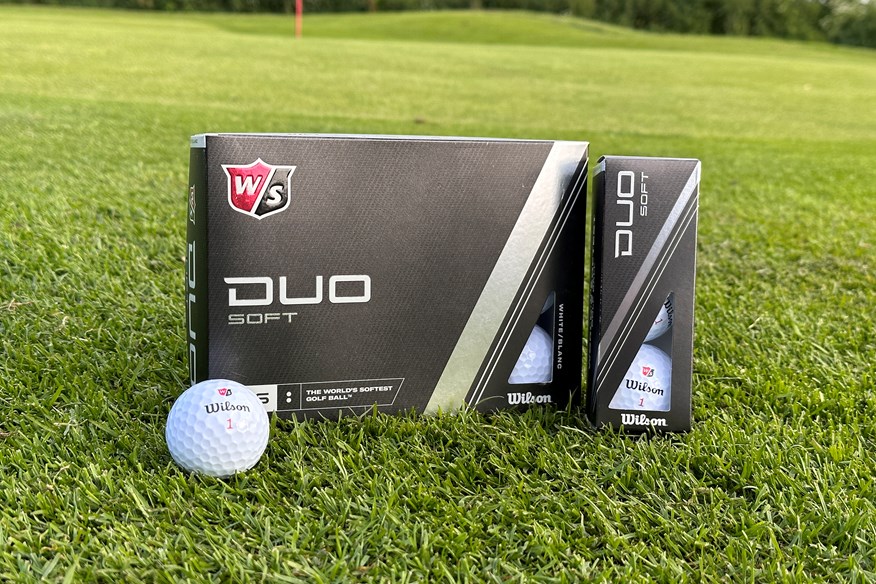

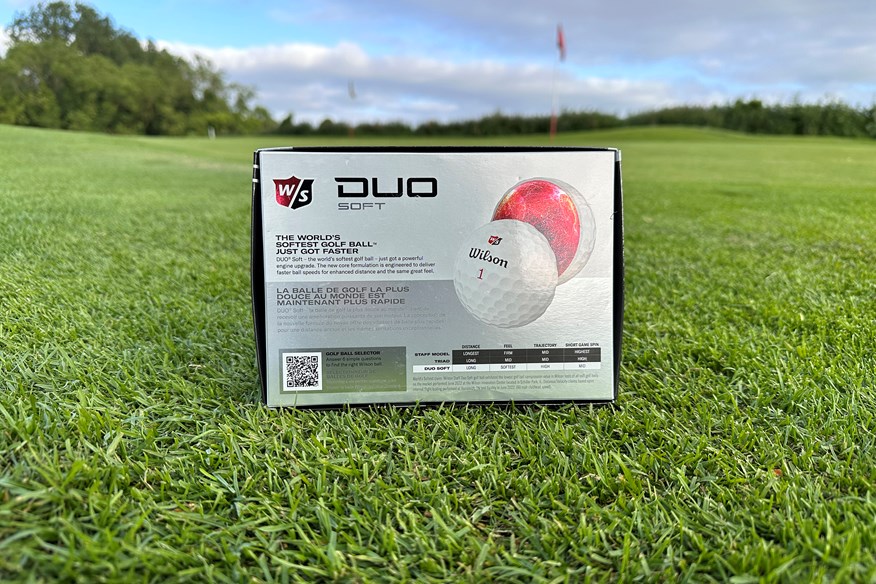
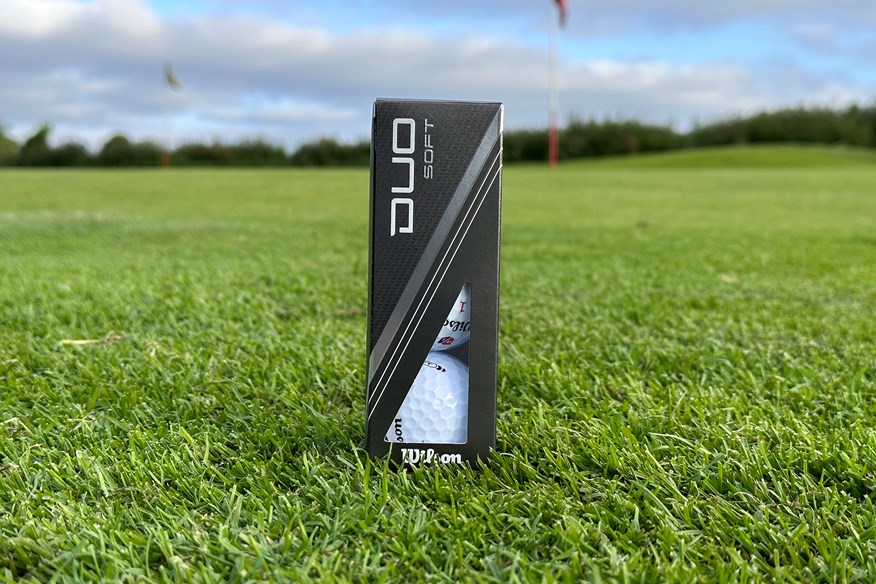
There are a lot of golf balls competing with the Duo Soft in the two-piece ionomer/surlyn cover category, but the Duo Soft is hands down one of the best models. With solid performance from tee to green, there isn't much that can go wrong with the Duo Soft, and being available for less than £20/$25 they're definitely a ball to consider that'll help you play good golf and save some cash.
The Duo Soft certainly held its own in our robot test. It was one of the best-performing two-piece golf balls we tested - both for distance and approach play. For slower swing speeds (85mph driver), this is one of the second-longest golf balls. It was only at 115mph driver swing speed that it started to show weakness distance-wise. However, the accuracy remained, and thoroughly impressed in this category.
Read our full Wilson Duo Soft golf balls review
Pros
- Incredibly soft feel
- Long distance off the tee for a ball of this nature
- Impressive spin rates
Cons
- Soft feeling might not be to everyone's liking
| Construction | 2-piece |
| Cover | Ionomer |
| Dimples | 302 |
| Feel | Soft |
| Flight | High |
| Long game spin | Low |
| Short game spin | Mid |
| Colour options | White; Yellow; Green; Orange; Red |
- Velocity boosting core
- Low compression core
Best Wilson Golf Balls: Data Comparison
| Wilson Staff Model X | Wilson Triad | Wilson Staff Model | Wilson Duo Soft | |
| 85mph Driver Ball Speed | 124.5mph | 123.6mph | 124.6mph | 122.1mph |
| 85mph Driver Backspin | 2722rpm | 2797rpm | 2657rpm | 2300rpm |
| 85mph Driver Carry Distance | 191.8yds | 193yds | 193.6yds | 194.1yds |
| 85mph Driver Shot Area | 17.9yds | N/A | 21yds | N/A |
| 100mph Driver Ball Speed | 145.7mph | 145.3mph | 144.8mph | 142.8mph |
| 100mph Driver Backspin | 2652rpm | 2768rpm | 2585rpm | 2272rpm |
| 100mph Driver Carry Distance | 245.4yds | 240.6yds | 244.3yds | 241.8yds |
| 100mph Driver Shot Area | 33.3yds | N/A | 20.3yds | N/A |
| 115mph Driver Ball Speed | 167.2mph | 166.4mph | 167.1mph | 162.4mph |
| 115mph Driver Backspin | 2084rpm | 2138rpm | 2079rpm | 1921rpm |
| 115mph Driver Carry Distance | 281.7yds | 292.7yds | 282yds | 286.8yds |
| 115mph Driver Shot Area | 38.6yds | N/A | 50.5yds | N/A |
| 7-iron Ball Speed | 108.1mph | 106.3mph | 108.7mph | 105.6mph |
| 7-iron Backspin | 6084rpm | 5629rpm | 5256rpm | 4738rpm |
| 7-iron Carry Distance | 151.8yds | 147.3yds | 156.4yds | 149.5yds |
| 7-iron Shot Area | 7.8yds | N/A | 13.3yds | N/A |
| Pitching Wedge Ball Speed | 85.1mph | 85.4mph | 84.8mph | 85.4mph |
| Pitching Wedge Backspin | 7982rpm | 7653rpm | 7329rpm | 7401rpm |
| Pitching Wedge Carry Distance | 105.4yds | 105.9yds | 105.8yds | 105.9yds |
| Pitching Wedge Shot Area | 3yds | N/A | 3.7yds | N/A |
Best Wilson Golf Balls: Buying Guide
How to choose which Wilson golf balls are best for your game
Wilson have a much smaller selection to choose from compared to other brands, so figuring out which Wilson golf balls to play with is potentially easier than with any other brand. Despite only having a select range of golf balls, there is an option for everyone and Wilson can be your ball manufacturer of choice throughout your golfing journey.
While the choice might seem straightforward because of there being such little choice, there are still a few factors to take into consideration in order to pick the best option for your game.
Budget
Depending on how much you want to spend you’ll cancel out one or two models, or you’ll still be choosing between all models. Wilson have golf balls at every desirable price point and all of their golf balls are competitively priced against market rivals. It’s worth considering Wilson’s golf balls if you would normally play with one of their competitors because it might help you come in slightly further under budget.
Ability
At this point, you have to be as honest with yourself as possible. Depending on your skill level, this should be a brilliant indicator as to which golf balls you should play with. If you’re new to golf or shoot around 90 and above then Duo Soft is likely to be the best option. If you’re looking to break 80 then consider Triad. And, if you play competitive golf or have a single-figure handicap then Staff Model is going to be your friend. Obviously, other factors can come into play, but this is a good basis for your thought process.
Feel
Wilson’s more premium golf balls (Staff Mdoel and Triad) are slightly firmer than similar golf balls by competitors – which might put some golfers off – but if you can look past feel then there’s unlikely to be anything else off-putting. Being the world’s softest golf ball, the Duo Soft is one for those who prioritize soft feel over all else, because you won’t find a softer golf ball (obviously)!
Does brand matter?
There are hundreds if not thousands, of golfers who won’t play with Wilson golf balls because of the name, but it shouldn’t put you off. If you start playing your best golf with a Noodle would you care? So why not give Wilson a go, even if you are precious about playing with a particular name? The fact is, most of us are, but if you can look past the name I guarantee you’ll be glad to have put a box (or more) of Wilson golf balls in your bag.
How We Test Golf Balls
At Today’s Golfer, we make it our mission to test golf equipment to the best of our ability in order to provide you with as much information as possible so that you can make a sound decision to help improve your game.
That’s no different when it comes to golf balls. In what is an extremely crowded marketplace, we do all we can to deliver as much clear information as we can so that you can find the perfect golf ball for your game.
There are hundreds of golf balls on the market all claiming to do the same job and that’s why we feel the need to take on the mammoth task of scrutinising these golf balls in any way we can to see which models are genuine and which are duds.
In our quest to ensure you’re well-informed it has led us to perform three golf ball robot tests, the first in 2019, our second test was carried out in 2023, and we followed that up with our third in 2024. Potentially, we could have a fourth golf ball robot test on the cards for 2025.
It’s all well and good hitting golf balls on the course, at the short game area, or on the practice grounds, but without access to an accurate launch monitor it’s very difficult to know exactly how a golf ball performs.
The same goes for human testing, in the sense that it’s very hard for a person to perfectly hit a golf ball every time, hence why we carry out robot testing with golf balls.
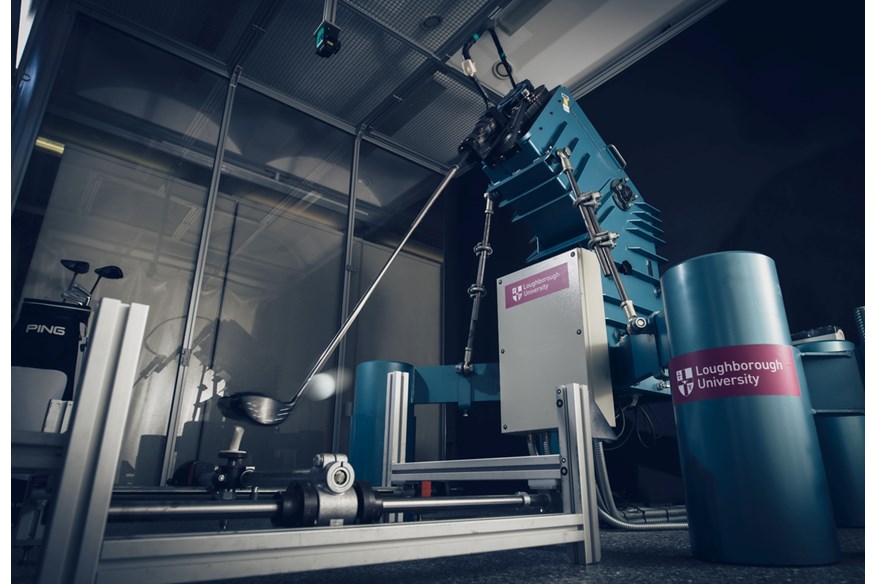
Leading our golf ball robot testing is our Equipment Editor, Simon Daddow, who spent a large part of his career as a golf club maker and product development manager, and has worked in the golf industry for more than 30 years.
We decide to perform golf ball robot tests because it’s the only true way to see the difference between each golf ball’s performance with a repeatable swing and consistently accurate impact location – which no human tester can reproduce.
Certainly not across different swing speeds and various club categories, especially when 20+ different golf ball models need testing.
Our robot testing takes longer than a week to complete, we spend months behind the scenes planning how to make it happen, and Simon spends a week crunching the numbers to determine our top-performing golf balls from each robot test.
With the costs of buying an R&D golf robot out of our reach, there aren’t too many options around. The brands that have them also make golf balls, which obviously presents a conflict of interest should we use one to perform a golf ball test against competitor models.
Loughborough University, though, is often referred to as the best sports science university in the world, and thanks to Ping’s introduction (who have invested in an R&D lab on campus) a couple of years ago it made perfect sense to explore the opportunity to collaborate in 2023 and again in 2024.
It takes months of setting up, but with Senior Lecturer Jonathan Roberts being a golfer and understanding our cause, and with Loughborough and Ping having no vested interest in golf balls, our partnership makes perfect sense.
We have always been about the club golfer here at TG, so it’s vital to us to test each golf ball at different swing speeds to show how each model will perform for you. So, no matter what your speed, you’ll find plenty of useful information within this test tailored to your own game.
Our driver shots were hit at speeds of 85, 100, and 115 mph (moderate, mid, and fast). For 7-iron we used a mid-80 mph speed. The pitching wedge was hit at 74 mph. To ensure our results reflect real-world golfers we also used the Ping clubs most suited to these speeds.
A 9° Ping G430 LST driver (with X flex Tour 2.0 Chrome shaft) at 115 mph. A 10.5° Ping G430 Max driver (with S flex Tour 2.0 Chrome shaft) at 100 mph. And a 12° Ping G430 Max (with R flex Alta CB Black) at 85 mph. We took the same approach for irons and wedges using the Ping Blueprint S 7-iron and pitching wedge (with S flex Dynamic Gold 120 shafts).
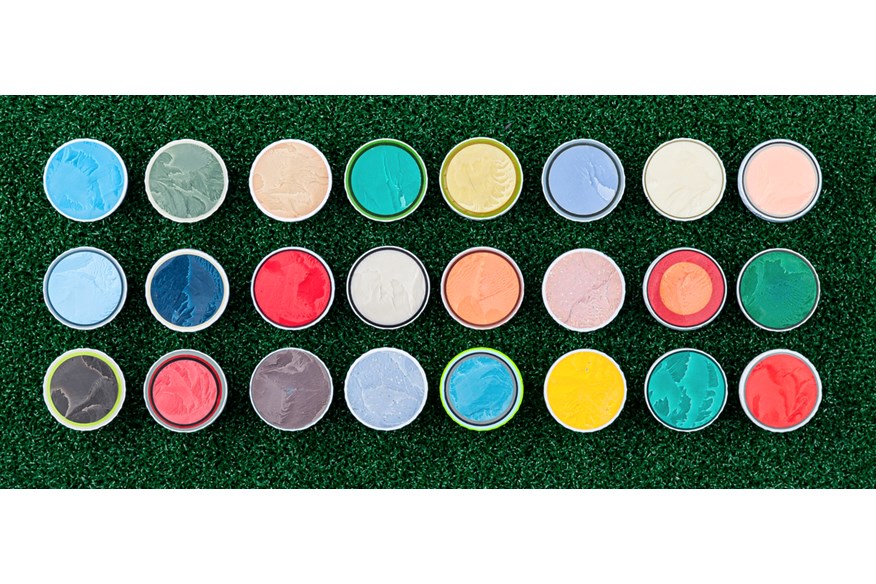
James Hogg, one of our Equipment Writers, is responsible for much of the on-course testing of golf balls where he applies his skills and knowledge from working in the golf industry since 16-years-old.
Thankfully, at Today’s Golfer, we are blessed to have a full team capable of testing all pieces of golf equipment – including golf balls. No matter whether a ball features or not in one of our robot tests, we ensure it’s put through its paces out on the golf course by one of our talented team members.
When we’re testing golf balls, both out on the course and on the robot, we’re always looking for certain aspects. With all golf balls, one of the most obvious aspects you’re able to judge with the naked eye is durability. For me, this is one of the most important aspects because if a ball isn’t durable then its value plummets through the floor – as does its performance.
Every other feature of a golf ball we’re scrutinising when testing golf balls is more ambiguous because they are more dependent on the wants and needs of the individual. For instance, feel is something that’s always discussed with golf balls, therefore, we make it one of our priorities to provide as much information as we can about feel, even if it contradicts what the brand says we’ll always stand by what we feel.
Flight and ball trajectory is much easier to draw conclusions from our robot test than any on-course testing because on course it can depend on what club we’re using, weather conditions, and how the ball sits either in the fairway or rough. Hence why it works much better getting this information from a robot because it delivers the same swing and strike with the same club. However, we will still mention how the ball travelled for us on the course compared to what we normally play or want to see.
Obviously, important factors to investigate are distance and spin, after all, these are ultimately what most golfers are interested in depending on whether they need to improve how far they’re hitting the ball or if they want to hit and hold more greens.
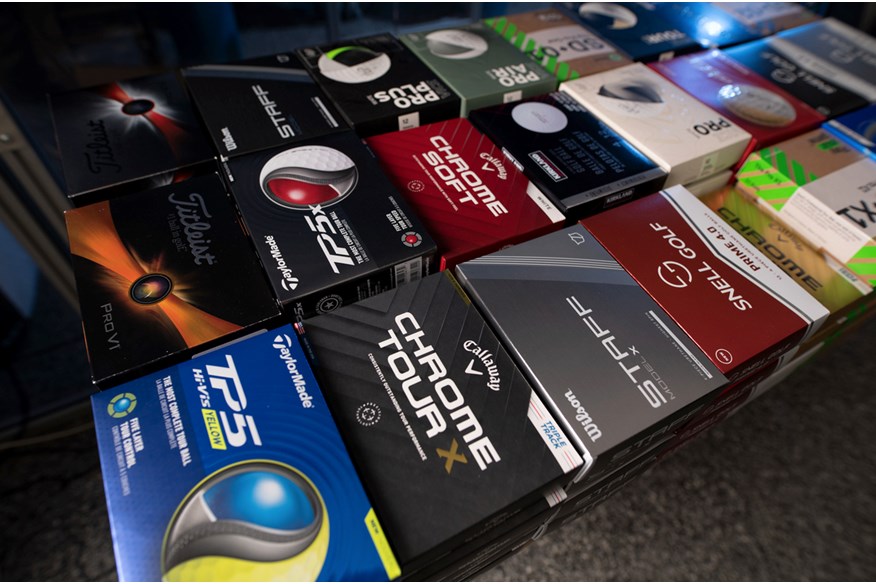
There are certain golf balls designed to do both for certain golfers, mainly the best premium golf balls that are built with Tour Pros in mind. However, if we’re testing a distance golf ball, we expect it to produce impressive and competitive distance, but we don’t expect it to grab really well on the greens so we account for this when we’re testing.
Most golfers will be interested in a golf ball that spins in the short game to give them all the control they need around the greens. When we’re out testing on course this is one of the most important aspects we’re looking at. I personally spend a large amount of time at the short game area playing chip shots and pitch shots to see how well each ball grabs.
For a golf ball to feature among the best Wilson golf balls, they have to perform well on the course and in our robot test. I don’t believe that every Wilson golf ball is worthy of being on this list. One of the four balls listed above will suffice for any golfer.
Best Wilson Golf Balls: FAQs
What is Wilson’s best golf ball?
The answer to this question is completely dependent on who you ask. Personally, I think the Triad offers amazing value for a wide range of golfers, I think the Staff Model is a brilliant alternative premium golf ball that doesn’t cost as much as other brands’ offerings. Also, the Duo Soft is a fantastic golf ball for the majority of amateur golfers and is very reasonably priced. It’s hard to say which is the best because they all offer something different, but they are all exceptional golf balls in their own right. However, I would lean towards the Staff Model, because it suits my game most.
Do any pros play with Wilson equipment?
Wilson have a whole host of Tour players playing with their equipment on both sides of the Atlantic, including three-time Major Champion, Padraig Harrington. There are a few Wilson staffers who have Wilson golf balls in the bag, including DP World Tour player Andrew Wilson. Wilson doesn’t have as many players using their equipment as some of the big guns on Tour, but those who play with their equipment are esteemed professionals who’ve enjoyed successful moments on the golf course.
Are Wilson golf balls as good as Titleist golf balls?
The short answer is yes. No matter what your standard, Wilson golf balls are as good as Titlist golf balls. Depending on how you play, you might have a preference for Titleist or Wilson, or you might find a Wilson or Titleist golf ball that suits your game better. But, strictly speaking, there’s no reason why Wilson isn’t as good as Titleist, and for some people, Wilson will be better.
Subscribe to Today’s Golfer Magazine! In every issue there are exclusive interviews with star players, equipment tests and buying advice, PGA pro tips to you help you shoot lower scores and our highly regarded Top 100 course rankings from around the world.
VIEW SUBSCRIPTION OFFERS
